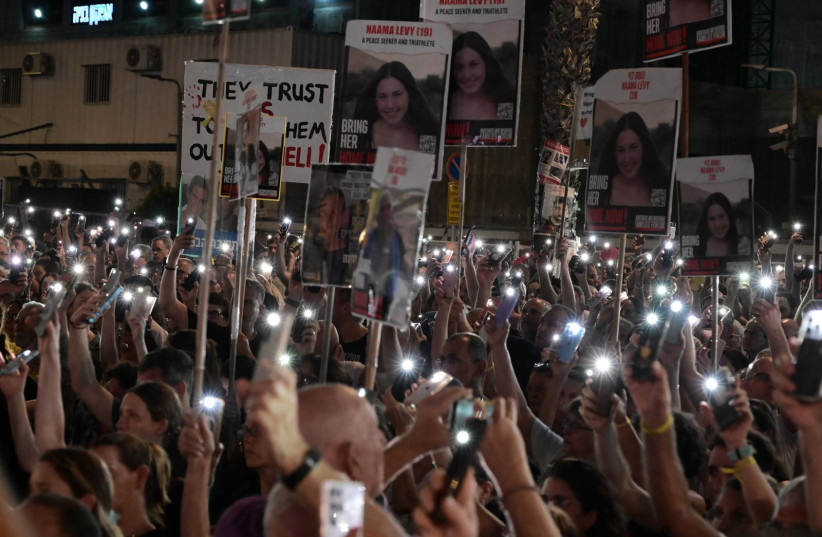Hamas stands firm against global pressure to accept hostage deal
Hamas stood firm Tuesday against global pressure that it accept the proposed three-phase deal, stressing that any deal which did not guarantee a permanent ceasefire from the start “was not an agreement.”
The Qatar-based Hamas leader Ismail Haniyeh released the statement after his sister was killed during an IDF airstrike in Gaza, accusing Israel of deliberately targeting her to pressure the group to take the deal.
“If [Israel] thinks targeting my family will change our position or that of the resistance, they are delusional,” he said.
He spoke out as Qatar and Egypt continued their efforts to close a deal; debate continued in Israel around the three-phase plan that US President Joe Biden first unveiled on May 31.
US State Department spokesperson Matthew Miller told reporters in Washington that Hamas had sent a written response to the deal several weeks ago. That response “rejected the proposal that had been put forward by Israel, [which] President Biden had outlined,” he said.

Miller recalled that the United Nations Security Council approved the proposal.
The deal would have delayed the issue of a permanent ceasefire, a sticking point between Israel and Hamas, to the second phase. It offered a first phase, during which talks over a permanent ceasefire would continue, while some 33 of the hostages would be freed in exchange for an immediate lull to the war.
The absence of a deal was one of the topics on Defense Minister Yoav Gallant’s agenda during the conversations he held in Washington during his visit this week, including with his American counterpart Lloyd Austin at the Pentagon on Tuesday.
Austin called on Hamas to accept the deal. “The onus is on Hamas to accept this roadmap to a durable end to this war,” he said.
“The failure of Hamas to accept this important proposal is prolonging the agony of Palestinian civilians and Israeli civilians,” he said.
“Israel recently conducted a daring operation to rescue four hostages unjustly held by Hamas in Gaza. We won’t rest until all the hostages are safely home. Including American citizens,” Austin said. He referenced the eight hostages with dual Israeli-US citizenship, of which five are still considered to be alive.
Austin, other officials call for Israel to engage in mediation to return hostages
“The only way to bring them [the hostages] all home is principle diplomacy. We must not miss this moment, and we must not risk indefinite war or insurgency,” he said.
In Israel, at the 21st Herzliya Conference, the country’s National Security Adviser, Tzachi Hanegbi, spoke of the importance of supporting the deal.
“We need to stand firmly behind this, together with the whole world,” he said, adding that it begins the process of returning the remaining 120 hostages.
Hanegbi’s words were a subtle dig at Prime Minister Benjamin Netanyahu, who on Sunday said he partially supported the deal, and those in the government who have vocally opposed it, such as Finance Minister Bezalel Smotrich and National Security Minister Itamar Ben-Gvir.
Netanyahu then backtracked in the Knesset plenum, pledged his support to the deal, and admitted that it was actually an Israeli proposal.
Hanegbi said on Tuesday that “Time is working against the hostages,” adding that this is why the issue has to be prioritized. Adding that he was among those who are optimistic that an agreement was possible, even though almost a month has passed and Hamas has not accepted the deal.
“I think that given the tremendous international pressure on Hamas today, there is a chance that it will do something,” Hanegbi said. He referenced the United Nations Security Council resolution to back the deal, noting that even those countries that usually side with Hamas had supported the resolution or didn’t oppose it.
That resolution was based on “the Israeli proposal for a deal that was adopted by Biden,” he said.
“There’s tremendous pressure on Qatar. And it is also placing pressure on its side on the Hamas leadership in Qatar to accept this deal as it is,” Hanegbi said. It’s possible that both the regional and the international pressure could be effective, he added.
Hanegbi recalled that he had just returned from Washington, where he and Strategic Affairs Minister Ron Dermer met last week with US officials, including US National Security Adviser Jake Sullivan and US Secretary of State Antony Blinken.
“We had a very intimate conversation very much focused on the issue of hostages,” Hanegbi said.“It’s our impression that the US’s commitment to the deal is 100%,” Hanegbi said.
Reuters contributed to this report.





Comments are closed.